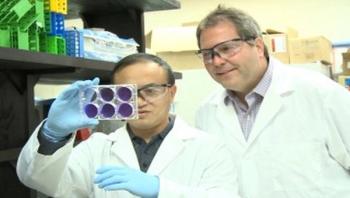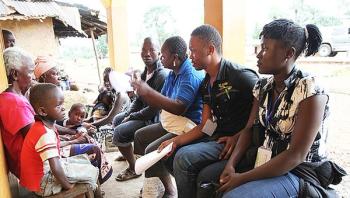
News


By unlocking the secrets of a bizarre virus that survives in nearly boiling acid, scientists at the University of Virginia School of Medicine have found a blueprint for battling human disease using DNA clad in near-indestructible armor.






A recent study with Kansas State University researchers details vaccine development for two new strains of avian influenza that can be transmitted from poultry to humans. The strains have led to the culling of millions of commercial chickens and turkeys as well as the death of hundreds of people.


With Canadian government funding, medical scientists have created and demonstrated a new tool that could dramatically lower the tragic annual toll of 760,000 infants and children killed, and millions more stunted, due to severe diarrhea. Using an inexpensive innovation in specimen collection, the Canadian-led team diagnosed previously unrecognized pathogens that had caused the severe diarrhea of more than one-third of children in a group of southern Africa hospitals.

The Association for Professionals in Infection Control and Epidemiology (APIC) and Infection Prevention and Control (IPAC) Canada annual conferences are just around the corner. Industry leaders will come together to exchange knowledge and creative solutions toward our shared goal of reducing hospital-acquired infections (HAI) and associated costs – financial and beyond. Many types of technology and solutions will be presented to enhance every aspect of the infection preventionist role, including hand hygiene compliance monitoring.



Researchers with the Fralin Life Science Institute at Virginia Tech have identified a gene responsible for sex determination in mosquitoes that can transmit yellow fever, dengue, and chikungunya viruses. Only female mosquitoes bite because they need blood for developing eggs, and researchers believe that a higher ratio of males could reduce disease transmission.



Bacteria resistant to antibiotics are on the rise. There are different explanations for how resistances are transferred. Researchers from the Vetmeduni Vienna found phages in chicken meat that are able to transfer antimicrobial resistance to bacteria. Phages are viruses that exclusively infect bacteria. They can contribute to the spread of antimicrobial resistance. The findings may also be relevant for clinical settings. The study was published in the journal Applied and Environmental Microbiology.





Growing evidence suggests that agricultural practices, especially widespread antibiotic use, could be contributing to the increasing antibiotic resistance problem in humans. In order to learn how to effectively control this spread of antibiotic resistance from livestock manure, the U.S. Department of Agriculture (USDA) has awarded a $2.25 million grant to a Virginia Tech team of engineers and scientists to examine the food chain from farm to fork.



Researchers led by St. Jude Children's Research Hospital scientists have developed a second-generation antibiotic that shows early effectiveness against common bacterial infections that pose a serious health threat to children and adults. The findings appear today in the scientific journal Science Translational Medicine. The study marks the second time in recent years that St. Jude researchers have created promising antibiotics by changing the chemical structure of an old antibiotic named spectinomycin. Spectinomycin is a safe, but weak drug first introduced in the 1960s.


Cheikh Ibrahima Niang, a professor of medical and social anthropology at the Cheikh Anta Diop University in Dakar, Senegal, has researched anthropological aspects of a wide range of health issues. In July 2014, WHO asked him to investigate community attitudes to Ebola virus disease. He led a team of anthropologists to Sierra Leone just as the outbreak exploded in the eastern part of that country. This is what he found.

